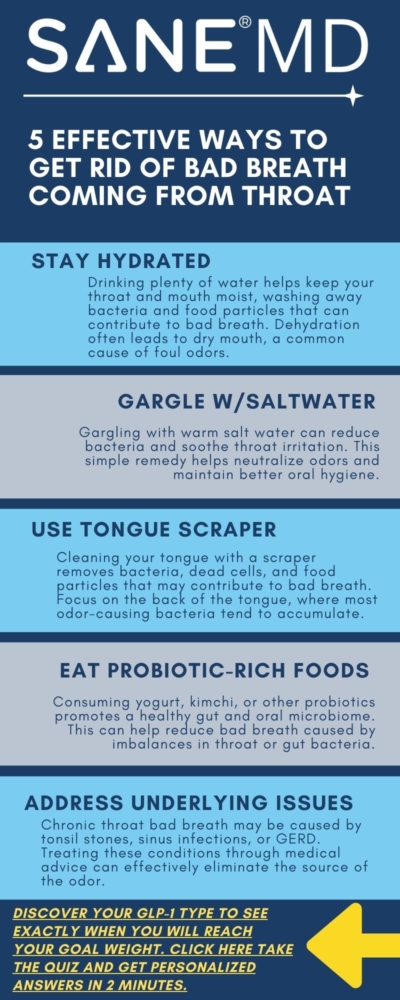Get Rid of Bad Breath Coming from Throat: Home Remedies & Prevention Tips!
How do you get rid of bad breath coming from the back of your throat?
Answer:
- Maintain Good Oral Hygiene: Brush your teeth, floss daily, and use mouthwash.
- Stay Hydrated: Drink plenty of water to keep your mouth moist.
- Avoid Foods That Cause Bad Breath: Limit consumption of garlic, onions, and spicy foods.
- Quit Smoking: Consider quitting smoking to improve your breath and overall health.
- Limit Alcohol and Coffee: Drink them in moderation to prevent dry mouth.
- Treat Underlying Medical Conditions: Consult a healthcare professional for diagnosis and treatment.
- Practice Good Sinus Health: Treat chronic sinus issues as recommended by a healthcare provider.
- Stay on Top of Dental Check-Ups: Regular dental visits can help identify and address oral health issues.
- Consider Saliva-Boosting Products: Use over-the-counter saliva substitutes or medications for dry mouth.
- Watch Your Diet: Eat a balanced diet with plenty of fruits and vegetables.
- Practice Good Habits: Avoid throat-clearing and sip water or suck on sugar-free candies instead.
- Chew Sugar-Free Gum or Mints: Stimulate saliva production and temporarily mask bad breath.
Are you tired of constantly trying to mask your bad breath with mints drink water, and gum, only to be met with temporary relief? Throat-related bad breath is an issue that many people face, but few are aware of the underlying causes and how to address them effectively. In this SANE MD throat cleaner blog post, we’ll delve into the world of “how to get rid of bad breath coming from throat”, exploring its causes, home remedies, and prevention tips to help you both fight bad breath and breathe a sigh of fresh, odor-free relief.

- New Report Says Your Brain Could Be the Key to Reducing Phlegm Over 50
- Doctor's "Leave The Throat Phlegm Behind" Tutorial Goes Viral With People Over 50
- Can You Relieve Throat Phlegm and Coughing In 60 Seconds A Day? This Doctor Says Yes
- How To Banish Phlegm When 50+ (Do This Every Day)
Key Takeaways
- Understand throat-related bad breath, including postnasal drip, tonsil stones and infections.
- Practice good oral hygiene and utilize home remedies such as salt water gargles, herbal remedies or apple cider vinegar gargle to reduce inflammation & bacteria.
- Make lifestyle changes like staying hydrated with 15.5 cups (3.7 liters) of water daily & avoiding tobacco/alcohol consumption for optimal oral health. Seek professional help if needed.
Understanding Throat-Related Bad Breath
While poor oral hygiene is often the primary underlying cause of bad breath and halitosis, throat-related issues can also significantly contribute to this unpleasant condition. Halitosis, commonly known as smelly breath, may be indicative of other health issues and can be exacerbated by certain dietary habits and unhealthy lifestyle choices.
When it comes to throat-related bad breath, there are three main culprits to consider: postnasal drip, tonsil stones, and infections.
Postnasal Drip
Postnasal drip refers to the buildup of mucus in the posterior part of the throat, which may lead to sensations of congestion, sore throat, or coughing. This buildup can be attributed to allergies, colds, chronic sinusitis, infections, or other respiratory illnesses, addressing postnasal drip can contribute to fixing bad breath.
Signs of postnasal drip may include:
- a sore throat
- a sensation of congestion
- coughing
- halitosis
Preventing these symptoms involves practicing good oral hygiene and treating the conditions causing postnasal drip. Also, supplementation with the right remedies and calibrated ingredients will help attenuate post nasal drips.
Tonsil Stones
Tonsil stones, or tonsilloliths, are small lumps of hardened material that form in the tonsils when debris accumulates and calcifies. These stones can cause:
- Persistent bad breath
- Throat discomfort
- An unpleasant taste in the mouth
- Earache
Treating tonsil stones without surgery, often achievable, can aid in eliminating those causing bad breath. or chew gum. Chewing gum can help to dislodge tonsil stones and alleviate bad breath. Additionally, it’s a good idea to chew sugar free gum to maintain oral health and further prevent bad breath caused by tonsil stones.
Infections
Throat infections are caused by bacteria, leading to the production of a pungent by-product that can cause bad breath. Viral infections, on the other hand, do not typically cause bad breath.
Potential infections that may be associated with bad breath include:
- Tooth decay
- Sinus infections
- Tonsillitis
- Laryngitis
Bad breath can be cured and further health complications cure bad breath, such as gum disease, prevented by treating these infections.
Home Remedies for Throat-Based Bad Breath
If a natural approach to tackling throat-related bad breath appeals to you, consider trying several home remedies. Gargling with warm salt water, utilizing herbal remedies, and apple cider vinegar gargles are all potential remedies that may help you find relief from bad breath.
These remedies work by reducing inflammation, eliminating bacteria, and clearing mucus from the throat, ultimately helping you achieve fresher breath. Surprisingly, because bad breath may be a sign of inflammation and Omega-3 supplementation has been show to help with inflammatory states in the body.
Gargling with Warm Salt Water
Gargling with either warm water or salt water can help to remove bacteria and mucus from the throat, thereby aiding in the reduction of bad breath. Here’s how to do it:
- Mix approximately 1/4 to 1/2 teaspoon of salt with 8 ounces of warm water.
- Gargle the solution in your throat for approximately 30 seconds.
- Spit it out.
Gargling with warm salt water as necessary is a recommendation for maintaining a clean, bacteria-free throat.
Herbal Remedies
Herbal remedies such as chewing cloves or parsley can provide an immediate and natural solution to cure bad breath. Chewing cloves can help improve breath odor and reduce the risk of bacteria-induced cavities in the mouth.
On the other hand, chewing parsley leaves can provide an instantaneous remedy for bad breath. Bear in mind that clove oil and powdered cloves could cause burns and should be avoided.
Apple Cider Vinegar Gargle
Apple cider vinegar gargles can assist in decreasing inflammation and eliminating bacteria in the throat. To create an apple cider vinegar gargle, simply mix equal parts of apple cider vinegar and water.
Gargling with this mixture can help neutralize the bad taste of breath odors caused by stomach acid and eliminate bacteria, providing relief from throat-related, bad breath odors.
Oral Hygiene Practices for Fresh Breath
Good oral hygiene is a crucial factor in combating bad breath, regardless of whether it originates from the throat or elsewhere in the mouth. Brushing twice daily and flossing regularly are essential for maintaining optimal dental health.
In addition, tongue cleaning assists in eliminating bacteria and food particles that can lead to halitosis. Replacing toothbrushes on a regular basis assists in avoiding the accumulation of bacteria and plaque, ultimately contributing to fresher breath.
Regular Brushing and Flossing
Brushing and flossing regularly not only help maintain good dental health but also remove food particles and bacteria that can cause bad breath. It is generally advised to brush your teeth twice a day, once in the morning and once before bed, and to floss at least once daily.
Regular visits to the dentist for professional cleanings and check-ups are key in preserving optimal oral health, preventing bad breath, and helping you practice good oral hygiene.
Tongue Cleaning
Cleaning your tongue is an often overlooked but crucial aspect of maintaining fresh breath. The tongue is a breeding ground for bacteria, saliva and food debris that can lead to unpleasant breath. Cleaning your tongue can be achieved with a toothbrush or a tongue scraper, and it is advised to clean your tongue on a daily basis.
Incorporating tongue cleaning into your daily oral hygiene routine is an effective way to combat bad breath and maintain a healthier mouth.
Changing Toothbrushes
Replacing your toothbrush every 3 months, or when the bristles become frayed, is essential to maintain good oral hygiene and prevent bad breath. Worn-out toothbrushes are less effective in removing plaque and bacteria, which can result in bad breath and other oral health issues.
Brushing and flossing your teeth before the appointment and bringing any pertinent medical information can contribute to a successful dental checkup.
Lifestyle Changes to Prevent Throat-Related Bad Breath
Apart from adopting good oral hygiene practices and trying home remedies, there are several lifestyle changes you can make to fight bad breath, especially when it’s throat-related.
Staying hydrated, adjusting your diet, and avoiding tobacco and alcohol can all help to keep your breath fresh and your throat healthy.
Staying Hydrated
To prevent dry mouth, a contributing factor to bad breath, it’s important to drink plenty of water. Dry mouth can be a result of dehydration as well health conditions such as from certain foods or medications, and it can lead to an excessive growth of bacteria in the mouth, resulting in bad breath.
Consuming approximately 15.5 cups (3.7 liters) of water daily is recommended to avoid dry mouth and maintain a clean, bacteria-free mouth. In addition to water, consuming foods with high water content, such as fruits and vegetables, can also help you stay hydrated and prevent bad breath.
Adjusting Diet
.Certain foods and dietary choices can contribute to bad breath and mucus buildup in the throat. Limiting dairy products, processed foods, and foods high in sugar can help reduce mucus buildup and diminish halitosis.
Instead, opt for a diet rich in fruits, vegetables, and foods high in fiber to assist in reducing bad breath. Consuming foods high in antioxidants, such as green tea, and foods high in Vitamin C, such as citrus fruits, may also assist in the reduction of postnasal drip and throat-related bad breath.
Avoiding Tobacco and Alcohol
Abstaining from tobacco and alcohol can have a significant impact on your breath and overall oral health. Both substances can cause a foul taste in the mouth, bad breath, and dry mouth, which can exacerbate halitosis.
Refraining from smoking and drinking is essential to avoid tobacco and alcohol. If you are already a smoker or drinker, quitting or reducing your consumption is imperative. Additionally, it is advisable to avoid secondhand smoke and drink water and to limit your exposure to alcohol.
Seeking Professional Help
If bad breath persists despite practicing good oral hygiene and making lifestyle changes, seeking professional help is advisable. Regular dental checkups can help identify and treat oral health issues that may cause bad breath, while addressing any underlying medical conditions with a healthcare professional can help tackle the root cause of your halitosis.
Dental Checkups
Regular dental checkups are essential to identify and address oral health issues that may be tooth decay and lead to bad breath. Having dental checkups every six months is generally advised.
At a dental checkup, the dentist will assess your teeth and gums, take X-rays, and clean your teeth. Brushing and flossing your teeth before the appointment and bringing any pertinent medical information can contribute to a successful dental checkup.
Medical Conditions
Consult a healthcare professional if bad breath persists despite good oral hygiene, as it may be a sign of an underlying medical condition such as:
- dry mouth
- infections of the nose, windpipe, or lungs
- chronic bronchitis
- postnasal drip
- chronic sinusitis
- gum diseases such as gingivitis
- certain metabolic disorders like diabetes, chronic kidney disease, and liver disease.
Addressing any underlying medical conditions is essential for effectively combating bad breath and maintaining overall dental health.
What’s the next breath?
In conclusion, understanding the causes of throat-related bad breath, adopting good oral hygiene practices, trying home remedies, making lifestyle changes, and seeking professional help when necessary can all contribute to eliminating bad breath and maintaining a healthy mouth and throat. By taking control of your poor oral hygiene and health, you can confidently face the world with fresh breath and a radiant smile.

Frequently Asked Questions
1. Why does my throat make my breath stink?
Bad breath is caused by bacteria in the tongue and throat breaking down proteins, releasing odorous volatile sulphur compounds.
2. What causes bad breath?
Bad breath is caused by sulphur-producing bacteria that break down proteins, releasing odorous volatile sulphur compounds which create a foul smell.
3. How to get rid of bad breath?
To fix bad breath or get rid of bad breath, practice good dental hygiene by brushing and flossing at least twice a day, scraping your tongue, avoiding foods that sour your breath, chewing gum instead of after-dinner mints, and keeping dentures or dental appliances clean. Additionally, keep your gums healthy, moisten your mouth regularly, and visit the dentist for regular checkups.
4. What home remedies can help combat throat-related bad breath?
Gargling with warm salt water, herbal remedies, and apple cider vinegar can help combat throat-related bad breath.
5. What oral hygiene practices should I adopt to maintain fresh breath?
Regular brushing, flossing, tongue cleaning and changing your toothbrush regularly can help maintain fresh breath.
SANE MD TRENDING ARTICLES:
Dr. Matthew Olesiak, MD, is the Chief Medical Director at SANESolution, a renowned wellness technology company dedicated to providing evidence-based solutions for optimal living. Dr. Olesiak earned his medical degree from the prestigious Jagiellonian University Medical College in Kraków, Poland, where he developed a strong foundation in medicine.







